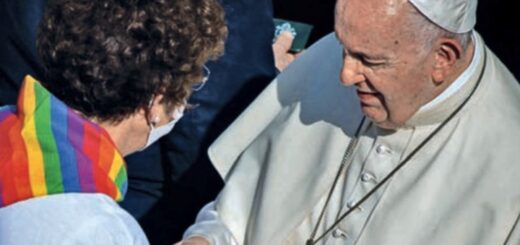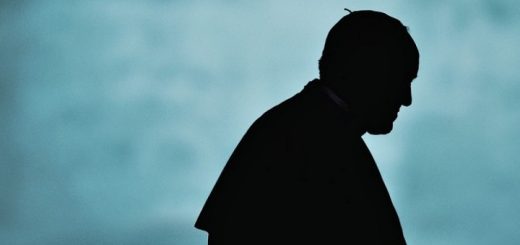The forbidden love of two gay soldiers relives in their written letters during the Second World War
Article by Bethan Bell published on the BBC website (Great Britain) on February 17, 2017, freely translated by Innocenzo
In the Second World War, during military training, Gilbert Bradley was in love. He sent hundreds of letters to the person he loved, who replied, always signing himself with a "G". Only 70 years later, he discovered that G was for Gordon and that Gilbert was in love with a man.
At the time, not only was homosexuality illegal, but those in the armed forces could only be shot for making homosexual sex.
The letters, which emerged after Bradley's death, in 2008, are therefore unusual and throw a new light on homosexual relationships during the war. But what do we know about this forbidden love story?
My dear, ... I am awake all night waiting for the postman early in the morning, and then when he does not bring anything about you they are a mass of nerves ... all my love forever. G. (Wednesday 24 January 1939)
The information collected by the letters indicate that Bradley was a reluctant soldier. He did not want to be enrolled in the army and even pretended to have epilepsy to avoid it. But his stratagem did not work, however, in 1939 he was assigned stationed at the Park Hall Camp in Ospestry, in Shropshire (Great Britain), to train as an anti -aircraft machine gun. He was already in love with Gordon Bowsher.
The couple met during a holiday in a floating house in the Devon in 1938, when Bowsher already had a relationship with Bradley's grandson. Bowsher came from a wealthy family. His father managed a navigation company and Bowsher owned tea plantations. When the war broke out, a year later, he was trained as a infantryman and was stationed across the country.
My dear boy, there is nothing but I want in life if not having you constantly with me ...
... I can see or I imagine I can see what the reaction of your mother and father would be ... the rest of the world has no idea what our love is - they don't know that it is love ... (February 12, 1940, Park Grange)
But homosexual life in the 1940s was incredibly difficult. Homosexuality was punished with the Court-Martial, the convictions to the prison for the so-called "serious indecency" were common and much of society strongly disapproved of homosexual relationships. It was only with the law on 1967 sexual crimes that consenting men of equal age, or over 21 years of age, were legally authorized (in Great Britain) to have homosexual relationships. But the openly gay in the armed forces was prohibited until 2000.
The letters, discovered after Bradley's death in 2008, "are rare because most of the homosexual couples of the past always get rid of these writings that could have them offended," says Peter Roscoe, gay rights activist.
In a letter Bowsher urges his lover to "do something for me definitively. I want all my letters to be destroyed. Please, honey, do it for me. Until then and forever I love you".
Roscoe says that these letters are a source of inspiration for their positivity. "There is finally a gay story that is not negative or full of tears "," many stories from the past speak of arrests as with Oscar Wilde or Reading Gaol. There are many horrible and terrible stories ". “But despite all these terrible difficulties, gays and lesbians have managed to get up above all this and to have, despite everything, a good life".
"My dear boy, for years I have been put in my head that no love could last for life ... I want you to seriously love, open your mind and try to see in the future. Imagine the moment when the war will be over and we will live together ... it would not be nice to already live it and from now on remember our life together, when it was in its maximum splendor. Your G.
(February 1, 1941 Kc Gloucester Regiment, Priors Road, Cheltenham)
But was it a love story with a happy ending?
Probably not. At some point, Bradley was sent to Scotland on a mission to defend Ford Bridge. There he met and fell in love with two other men. Rather surprisingly, he wrote and told Bowsher of his stories north of the border. Perhaps even more surprisingly Bowsher wrote to him “I understood why they fell in love with you. After all I am too. "
Although the couple was written continuously during the war, their letters stop at 1945. However, both continued to have interesting lives. Bowsher moved to California and became a well -known horse trainer. For a strange case of fate, he assumed as a worker Sirhan Sirhan, who would have been sentenced for the assassination of Robert Kennedy.
Bradley was instead, for a short time, involved in a romantic story with the parliamentarian Sir Paul Latham, which was imprisoned in 1941 after being sentenced by a martial court for "improper conduct" with three artillerymen and a civil. Sir Paul was reported after some of his "prying letters" were discovered.
Instead Bradley moved to Brighton and there he died in 2008. A company that was emptying his apartment found the letters and sold them to a trader specialized in military mail. The letters were finally purchased from the Museum of the city of Ospestry, when his curator Mark Hignett was looking for objects connected to the life of the city on Ebay.
At the beginning he bought only three and recalls that the content led him to believe that the sender was a girlfriend and a boyfriend in love. They were letters that spoke of the living conditions and their dreams for a future life together. When he noticed that there were others for sale, he collected them and transcribing the letters, for an exhibition of the museum, Mr. Hignett and his colleagues discovered the truth. The "girl" was a boy.
The revelation struck Hignett, who describes this experience similar to reading a book that you find that it has the last page torn: "I had to continue buying all the letters to find out what would happen".
Although he spent "Thousands of pounds"To collect over 600 letters, it is sure that in terms of historical value this correspondence is" priceless ".
Remember how “These letters are extremely rare because it could be offended for them - gays could be sentenced to years of prison with or without forced labor ". "There was also the possibility that gay soldiers were shot."
The museum, where the letters will also be exhibited, wants to collect them in a book. Perhaps very acutely, in one of the letters we find written:
"It would not be wonderful if all our letters could be published in a more tolerant future. Then the whole world could see how much we are in love."
Original text: Forbidden Love: The WW2 Letters Bethaeen Two Men






